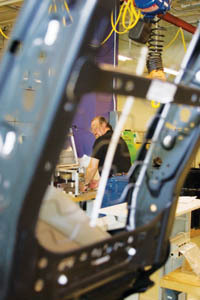
Daryl Denault, a technician at Sensata Technologies, works on a car seat occupant weight sensor.
New owner keeps Attleboro team in place
Executives of the former Sensors & Controls division of Texas Instruments went through hundreds of names before they finally decided to call the new, independent company Sensata Technologies Inc. The name “sensata” in Latin means “those things gifted with sense.”
And it surely made “sense” for the Attleboro company, which has about $1.2 billion in annual sales, to split from Texas Instruments and stand alone through a leveraged buyout by global investor Bain Capital, said Tom Wroe, Sensata president and CEO.
The $3 billion deal was announced in January and was completed last month.
“Texas Instruments decided because it’s so focused on [digital signal processors] and high-performance analog, and it really wants to be known for that,” Wroe said. “With their growth expectations and shareholder value perception, we decided it would be better to look at a divestiture. I think this is one of those rare win-win scenarios.”
Wroe said because of growth in Texas Instruments’ natural markets, the semiconductor giant is growing by 15 to 20 percent per year. TI’s markets include cell phones, MP3 players and consumer electronics. Sensata caters to the automotive and household appliance industries.
“We’re in markets where we feel very good if we can grow at 10 percent a year,” he said. “When you have those two different levels of expectations, we would have gotten into value conflicts over the long term with TI.”
Sensata started out as an independent manufacturer in 1916, making gold plating for the jewelry industry. In 1931, it merged with a Cambridge company and became the Metals & Controls Corp., which turned metal into engineered materials. Texas Instruments acquired the company in 1959.
A global private investment firm based in Boston, Bain Capital, has a record of purchasing “non-core” divisions of major companies and partnering with the management team to grow them. The firm was advised on the deal by JPMorgan Chase; financing is being provided by Morgan Stanley, Bank of America and Goldman Sachs.
In an e-mail reply to a reporter’s query, Steve Zide, a managing director at Bain Capital, said the firm believes that “as a stand-alone entity, Sensata will be able to better focus on the customers and markets it serves, and to seize the significant growth opportunities that exist in the marketplace.”
Sensata employs about 5,400 people worldwide, including about 1,000 at its Attleboro headquarters. Wroe said about half of them are engineers recruited from schools in the region, from the University of Rhode Island to the Massachusetts Institute of Technology.
Though a small portion of the company’s manufacturing is done on site, Wroe said, most production takes place in Mexico, Asia and Eastern Europe.
Sensata’s engineers work closely with engineers at General Motors, Ford, DaimlerChrysler, Honda, BMW and Volkswagen to develop sensors. The sensors are used in cars’ air conditioning, braking systems and air bags.
Some sensors perform simple tasks such as monitoring the injection of fuel in a diesel engine. Others can detect the weight of a passenger in a seat of a car to determine whether it’s a child, and signal the air bag to deploy with less or more force in order to prevent injuries.
That type of innovation and the creativity of Sensata’s engineers “is really what is keeping the company going,” Wroe said.
On the controls side, Sensata develops and manufactures electrical protectors in dishwashers, refrigerators, hair dryers and lighting for customers such as Emerson Electric, General Electric, Whirlpool, Maytag and Samsung. The protectors shut down compressors when something goes wrong so appliances won’t overheat or catch on fire.
Most of Sensata’s customers have been with the company for more than 20 years, and some reacted cautiously to news of the divestiture, Wroe said.
“They want to see how we will behave,” he said. “And we’re going to behave exactly the same. We’ll build the confidence they’ve had over all these years, but it’s going to take time.”
Looking ahead, Wroe said now the company can create and manage its own future. It can determine what its level of research and development should be, where to invest capital, and whether or not it wants to acquire smaller companies “to really amplify what we are trying to do strategically.”
“One year we might make the decision to invest more and not make as much money because we think it will pay off three years down the road,” Wroe said. “That would have been a hard decision under Texas Instruments.”
“We’re still going to be a strong financial player,” he added. “But we’ll have a little more flexibility. … We think we’ll be able to accelerate the growth rate going forward.”











